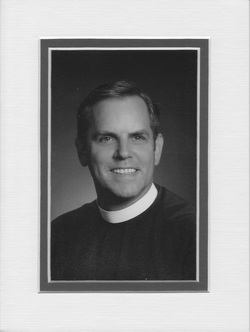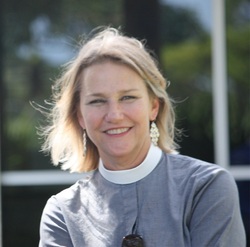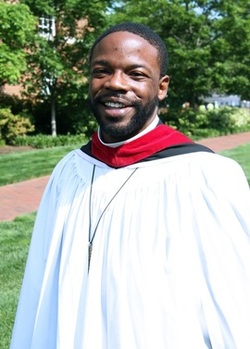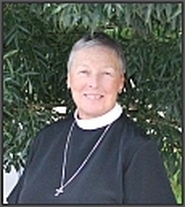 May 18 Day 132: II Kings 13-15; Psalm 110; Acts 25
Last month on April 21st, 2013, I was enthroned as the First Diocesan Bishop of Toliara, Madagascar. Over 500 were in attendance but unfortunately we could only hold 200-250 in the church. The others had to remain outside sitting under a makeshift tarp. It was a beautiful five-hour service, which certainly didn’t seem that long for me. I was placed in the Cathedra, the Diocesan Bishop’s seat: the place of authority. Even though the chair was a very simple design made with hard wood, the canopy was elaborately hand-carved using Malagasy design, reflecting a Malagasy art.
One of the most touching moments of the service was at the end, when I got up to thank all of those in attendance. Unbeknownst to me, all of my clergy stood up and walked behind me, standing behind me as I spoke. I didn’t realize what was happening until afterwards since I was trying to remain focused. They wanted to send a message to all people present that they were in solidarity and support for their Bishop. My troops were there, standing up for me, ready to go to battle if needed.
As we look at Psalm 110, we are reminded that it is one of the Old Testament Messianic passages of the coming Christ. In this case, it is a coronation Psalm, composed for the enthronement of the Messianic King. The Psalm proclaims that the King will extend his territory among his enemies, and his own troops will be there when needed, on the day of battle.
Most of missionary life I have been going to battle for the Lord and being a voice for the voiceless. Now I have colleagues who are willing to go to battle not only with me, but also for me. I found strength as my clergy stood behind me, indicating harmony and unity. This was a very humbling Christ-like moment for me, especially considering the challenges and difficulties of creating a new diocese over these past three years.
I was reminded of Jesus, who went to battle for us on the cross. The Bible says we are the ones who should have been on the cross, but Jesus replaced us by putting himself on the cross for our sins. Secondly, when we go through life’s battles, we don’t have go through them alone. Not only does God promise to be there through his Holy Spirit, but he also gives us each other - the body of Christ - to encourage us and go into battle with us.
I’m not sure what you are going through today whether it is anxiety, loneliness, unresolved tension, sadness or making a tough decision. Whatever it is, you don’t have to go through it alone. Jesus is with you and the Body of Christ is willing to go to battle with you. Call a Christian friend or a colleague and ask them to join with you in solidarity and go through this together.
What a relief it is that we don’t have to go through life alone.
The Right Rev. Todd McGregor
Diocese of Toliara
 Day 131 – II Kings 10-12, Psalm 109, Acts 24
Reading through First and Second Kings, one gets the idea that idolatry is a really bad idea – but one that won’t go away.
In today’s readings, Ahab and Jezebel, the dastardly royal couple that led Israel into Baal worship, are dead. Now we watch as Israel’s new king Jehu oversees another bloodbath. Jehu has Ahab’s sons, friends, advisors and extended relatives slaughtered, not to mention all the self-professed Baal followers in the land. In doing so, Scripture tells us Jehu finally destroys every trace of Baal worship from Israel.
It is an awful purge. The optimistic reader hopes this house-cleaning will finally set things right among God’s people. But as king, Jehu himself “refused to turn from the sins of idolatry.” Jehu wasn’t worshiping Baal, but neither was he insisting on Temple worship according to God’s plan. Again, Israel is led into compromise.
It’s easy to think of ourselves as too developmentally advanced to worry about idolatry. But even back in Ahab’s day, idol worship was as much about fitting in with surrounding cultures as it was about graven images. These days, even good things such as romantic relationships or providing financially for our families or managing our kids’ myriad activities can be harmful to our souls if we give those things first place in our hearts. After all, that’s a place that belongs to Christ alone.
Today may the stories of Judah and Israel inspire us to keep the first and greatest commandment: to love the Lord our God with all our heart, mind, soul and strength. Let us travel with Paul on the life-giving Way of the resurrected Jesus.
The Rev. Susan Beebe
Priest Associate, St. Gregory's, Boca Raton
 Daily Reflection for May 16 or Day 130
Daily Blog – Day 130 - II Kings 7-9, Psalm 108, Acts 23
The timelessness of Scripture is that we are able to identify our own humanity at work. It is certainly never a pretty picture. Even as people of faith, we, as if looking into a mirror, can see what we are truly about in our sinful and broken state. Society today only makes it worse as it promotes and models the power of self, of rugged individualism, of getting ahead at the expense of others, and of being in control of one’s life direction. The raw reality of our human condition is not only exposed, but what is truly demonstrated is the profound need for faithful prophets, leaders, and mentors. Such is needed today to awaken and expose us to the truth of the life God intends and Christ revealed for us.
In our reading from II Kings, the story line continues to expose the need for God’s people to trust God and not put their faith in human ingenuity and manipulations, in good kings and in bad kings. Elisha, the prophet of God, comes onto the scene recounting deeds of God’s love and healing, and admonishes kings to be accountable. Even his name, meaning “God has granted salvation,” reminds us through these stories of intrigue, rebellion, greed, deliverance, hope, and new beginnings that we must always ask, “Will we as the people of God trust God and truly seek to be guided by God?”
Paul faces the same question as he stands accused before the judgment council as we read in Acts 23. A conspiracy rises to take his life. Will he trust God? Will he stand firm and steadfast in the love of God? God speaks to him and encourages him to trust and to do as he had in Jerusalem, to preach Christ to all that he encounters.
The invitation stands for us also with this modern and tumultuous world. It is difficult to trust, and believe, and to follow as God wills. The mores and values of society stand as our temptress and our obstacle to faith. Nevertheless there is daily the invitation to believe and trust in God’s presence, God’s power, grace and steadfast love. God is ever present through the Holy Spirit, enabling and empowering us to be an d do as Christ. As the psalmist reminds us, we are called to fix our hearts on God. By doing so we are empowered and strengthened for each day.
O grant us help against the foe,
For vain is the help of man!
With God we shall do valiantly;
It is he who will tread down our foes.
(Psalm 108:12-13)
The Very Rev. Dr. William L. Stomski Chaplain and Sacred Studies Educator, Saint Joseph’s Episcopal School, Boynton Beach Dean of the Diocesan School for Christian Studies
 The Bible Challenge
Day 129
2Kings 4-6
Psalm 107
Acts 22
Have you ever suffered the loss of a child? Or, has your family ever been so broke that you were uncertain how to put food on the table, or pay the mounting bills? Have you ever contracted a disease or experienced a physical disability which literally crippled your desire to live? In some personally intimate ways,
I have experienced each one of these life challenges. Therefore, I was able to
empathize with those in our reading from 2 Kings.
In each of those life situations, Elisha was the presence of God. He was this
for the poor mother who was soon to lose her sons due to poverty, the
Shu’nnammite woman whose son had died, and even the bravado Na’aman whose body
was plagued with Leprosy. The feminine heart of the mothers, I suppose, was able
to “see” that Elisha was a Holy Man of God. Their hearts became humbled as they
sought relief from their suffering. God acted. Their lives and family were
restored. Na’aman, on the other hand, had a problem with pride. He had traveled
all that distance with the hope that he would be made well. Upon reaching his
destination, the Promised Land, he was told by the Holy Man to wash in the
Jordan seven times. In response, he got angry and went off in a huff. However,
his servant convinced him to accommodate Elisha and perform the simple gesture
of washing. Na’aman had a conversion of heart… it became humble. He washed and
was made clean.
In Acts we see were St. Paul was sharing the story of his former life. He was
the best of the best! A Jew, a Pharisee, a Roman citizen, a man possessed with
doing his job: the purging of this new Christian sect. His heart was fixed on
eliminating this corrupt heresy of Jesus resurrected from the dead, the promised
Messiah. He then describes in great detail the conversion experience he had on
the road to Damascus. He was turned around. He had a “metanoia” experience that
changed him forever. His heart was humbled allowing him to receive the grace of
God. This Grace empowered him to be one of the greatest evangelists for the
Christian faith.
The theme for our readings today for me… is that God engages our lives. He is
a God, in Jesus, who desires an intimate relationship with us. God wants our
hearts! God wants our wills! God wants our all surrendered to Him! This requires
a daily conversion of the heart, the surrender of our willfulness to the Will of
Jesus for us.
Something very wonderful will transpire if God’s grace and our own
willfulness allow for the conversion of our heart. We will be able to sing
praises to our God as did the women and Na’aman in 2 Kings, as did St. Paul in
Acts, and as did the Psalmist. Our song will be, “Glory to God whose power,
working in us, can do infinitely more than we could ask or imagine: Glory to him
from generation to generation in the Church, and in Christ Jesus for ever and
ever. Amen!” (BCP p. 102)
The Reverend Bernard J. Pecaro,
St. Martin, Pompano Beach
 Reflection for Day 127, May 13, 2011
1 Kings 22; Psalm 105; Acts 20
I remember the maps that were at the back of the Bible I grew up with as a boy: a fascinating collection of kingdoms and travels and journeys and people. The last chapters of the Book of Acts really cry out for those maps! “Paul the Peripatetic” moves so fast and furiously that even a “connect the dots” chart wouldn’t be much help.
Luke, in his writing, seems to be more concerned that
his readers see the tremendous spread of Christianity throughout the ancient world, rather than going into detail about what is happening in any given
community of faith. There is no mention, for instance, that during his time in
Corinth, Paul wrote his Letter to the Romans. Nor is there any reference to his
great concern for the trouble in the Church in Corinth itself. It seems certain
that one of Paul’s primary reasons for visiting so many places was to raise up
the matter of a collection for the Jerusalem Church. We see evidence of this in
a number of his letters, and his commitment to the unity of Jewish and Gentile
Christians comes out time and again. He saw Jerusalem as the “Mother Church” and
wanted others to realize and appreciate their commitment to, and unity with, the
mother church. (Wow, does this sound familiar to me?!)
This plea for connectedness and unity even pervades Paul’s apologia to the elders of Ephesus.
He reminds them of his honesty and frankness in all his dealings with them and
how he never held out the hope of resurrection without the suffering of the
cross. His admonishment to remember “the words of the Lord Jesus, how he said,
‘It is more blessed to give than to receive’” asks them not only to consider
their relationship and obligation to support the Jerusalem Church, but also to
share what they have received from Paul’s teachings. His larger-than-life
persona certainly is appreciated by those gathered around him.
TVR Doug McCaleb, Dean
Trinity Cathedral Miami
 Day 125 – I Kings 19-21, Psalm 104, Acts 19
The point of a comic book is to entertain. However, in addition to entertaining, comic books lift up the values of the hero. Comic books point out the righteousness and victory of the hero's way of life. Comic books are meant to be fun and affirm our way looking at justice. Violence is used in comic books, even grotesque violence, but even so violence is not the point of a comic book. The point is joy and the affirmation of a world view.
I find that the Biblical account of Elijah reads almost like a supper hero's comic book. The action is intense. The images are vivid and the hero believes in truth, justice and the Godly way. Each individual verse of this 1 Kings passage keeps us wondering what is next and what could be illustrated in a little square box. The excitement starts with a recount of Elijah's killing of the prophets with the sword. It goes on to hint about a sequel in the ordaining of Elisha. It ends with a violent condemnation of corruptness.
In all this excitement it is important to pay attention to the values of the Elijah. Elijah's over the top victories and actions point to God. Elijah is a priest. He places God first and God is the source of his power. Obedience to God and worship of God and dependence on God are paramount in all of Elijah escapades. He swoops in and at the last minute brings goodness with God's way. The Heroicness of Elijah is a striking image that honors God and elevates a dependence on God.
In the Acts reading we see the people of Ephesus, who make their living by selling images. Their images far from honor God. They point to gods. The makers of these images are not so worried about losing their Gods but of losing their livelihood. They are worshiping the idle of money. They take no offence at the idea of God in Christ. They take offence at the possibility of having to depend on God. Both this Acts reading, and the 1 Kings reading point to the importance of depending on God.
Keep Reading.
The Rev. Spencer B. Potter
St. Andrew's Episcopal Church
 Friday May 10, 2013 -- Day 124 I Kings 16-18; Psalm 103; Acts 18
“Bless the Lord, O my soul, and all that is within me, bless God’s Holy Name.
Bless the Lord, O my soul, and do not forget all his benefits…”
Today we read in I Kings 17 one of the best stewardship stories in the Bible. Elijah, one of God’s greatest prophets is being directed by the Lord from one desolate place to another for his own survival. It seems the land had gone dry and was withering. Elijah is directed to Zarephath, where he is told a widow will feed / care for him. But as Elijah finds the poor widow she is preparing herself for death. She has barely enough meal for herself and her son to have one final meal before they die.
But Elijah instructs the widow to go on with her plan but first to share some of the small measure of meal she has left and make him a small cake of it for his consumption. Afterward, Elijah instructs, “make something for you and your son. For thus says the Lord the God of Israel: The jar of meal will not be emptied and the jug of oil will not fail until the day that the Lord send rain upon the earth.” Following Elijah’s instructions the widow, her son and her household ate for many days. “The jar of meal was not emptied and the Jug of oil did not fail!”
It is tempting to look at this story as one of “giving-to-get.” The widow is in fact promised a happy ending before she gives. But the correct Stewardship emphasis is that the widow trusted in God’s promise and steadfast love. The widow gives to God – God’s prophet – before taking the final measure for herself and her son. At that moment she has only hope, not absolute assurance things will turn out favorably. She shares from her very final essence with this stranger and trusts in God.
What is our own theology of Giving? Do we give only to get or only from our excesses after our wants and desires are met? No one can promise that when we put that two or three hundred dollars in our Pledge envelopes each week that they will magically reappear in our wallets or purses the next day. But what is promised is that by entering this trusting relationship with God, our own awareness of God’s steadfast love will increase and never be ‘emptied or fail.’
The Ven. Thomas A. Bruttell
Archdeacon for Transitional Ministry
Diocese of Southeast Florida

Day 123 or May 9, 2013
1 Kings 13-15; Psalm 102; Acts 17
So many kings and their loyal subjects did “what was evil in the sight of the Lord” and suffered the consequences of their selfishness, pride, envy, greed, deception, murder, lust, and arrogance. Only King Asa (thus far) has done what was right in the sight of the Lord” since King Solomon turned from the Lord. And the human bloodshed of war and injustice raged on and on. (I feel you, Elijah, waiting in the wings…)
The psalmist sees that following the way of the Lord is the only way to find that peace that passes understanding. In the midst of affliction he prays for all generations and nations of the world to mend their ways, “Hear my prayer, O Lord. Let my cry come unto you.”
I’ll bet there were many praying this prayer in the agonizing days about which we read in 1Kings: those who were afraid to rise up… families around dinner tables, workers in the fields.
I’ll bet there are many praying this prayer today.
I pray for myself, my family, and for all of us that we would have the humility to confess the self same sins of old in the silence of our own hearts. How easy for me to hear these stories and smugly sit by condemning them when I have plenty for which to repent in my own life. And we have the witness and strength of those who have gone before us and this precious text in which we are immersed. We run to the comfort of the gospel of our Lord listening to Paul: “… indeed he is not far from each one of us. For ‘In him we live and move and have our being’…”
The Reverend Wendy Tobias
Associate Priest,
St. Joseph’s Episcopal Church
Boynton Beach, FL
 Race and Power in Receiving God
The story of Makeda, the Queen of Sheba, is always fascinating to me. For the mother of Solomon’s first-born son to be an African woman is a powerful thing. (Solomon himself was half African, as his mother Bath-sheba was a woman of the same region from whence Makeda came.) Yet, there are many lessons that the Queen of the South rises up to teach us.
I want to meditate on two in particular: race and power. I want us to consider how those two impact ones ability to receive God. As we debate immigration and the worthiness of the Other to become heir to the blessings of our Country, I find it interesting that of all the kings and queens who would have heard of Solomon’s wisdom only this African queen felt it necessary to come and sit with Solomon to learn from him. Wise in her own right, she was able to “test Solomon with hard questions” (1 Kings 10:1). Yet, she alone is said to posses the boldness that would encourage her to seek out Solomon when her contemporaries would not. The story of Makeda demonstrates that race is not a factor in ones God-given worthiness in the eyes of God.
Some may ask how I know this. Well, given ancient Jewish custom towards women would we expect historians to chronicle a story of a queen if there were similar extant stories of kings?
It is of this unexpected phenomenon that Dr. Alice Ogden Bellis speaks in her book, Helpmates, Harlots, and Heroes[http://ow.ly/kLVZ4] when she states that “We are fascinated with this rich queen who travels freely and interacts with Solomon as an equal.” That a woman in this time had the wealth to travel such a great distance and then heap upon Solomon gifts in an abundance “never again” to be seen is indeed a compelling social statement (1 Kings 10:10).
Clearly, this African woman possessed immense wealth. Of course Solomon was wealthier. Yet, the Queen of Sheba did not live in want. She was an equal and had no need to visit Solomon. Because of her wealth, she could have assumed temporal security. Yet while we can assume her contemporaries suffered that false sense of security, Queen Makeda was not disillusioned by her wealth.
In her wealth, she was still aware of her need for something more. And, in her desire for more she humbles herself to approach Solomon.
The paradox here is stark: the boldness of the Other juxtaposed with the humility of the rich. In boldness with humility, the Queen of Sheba embodies them both and demonstrates how we ought approach Wisdom - Who is our God. In our diversity, we must be bold to not allow ourselves to be marginalized by those who feel our witness to be subject to majority interpretations. In our abundance, we must be humble enough to be aware of our need for “something more.”
May God bless us with such boldness and humility that we might receive the fulness of His divine bounty! Amen!Fr. Jabriel S. Ballentine is a social commentator and blogger at www.JahBread.com
 The Bible Challenge – Day 121
I Kings 7-9; Psalm 100; Acts 15
According to the Hebrew Bible, Solomon's Temple, also known as the First Temple, was the Holy Temple in ancient Jerusalem, on the Temple Mount (also known as Mount Zion), before its destruction by Nebuchadnezzar II after the Siege of Jerusalem of 587 BCE. The Hebrew Bible states that the temple was constructed under Solomon, king of the Israelites. This would date its construction to the 10th century BCE, although it is possible that an earlier Jebusite sanctuary had stood on the site. During the kingdom of Judah, the temple was dedicated to Yahweh, the god of Israel, and is said to have housed the Ark of the Covenant. Rabbinic sources state that the First Temple stood for 410 years and, based on the 2nd-century work Seder Olam Rabbah, place construction in 832 BCE and destruction in 422 BCE, 165 years later than secular estimates.
In today’s reading from I Kings 7-9 we are treated to a detailed description of what must have been this absolutely stunning and magnificently grand “house” built by King Solomon as the final home for the Ark of the Covenant. We are also treated to yet another magnificent prayer with petitions (I Kings 8:22-9:9) in which Solomon speaks directly to God reminding him of his divine promise to David that “There shall never fail you a successor before me to sit on the throne of Israel, if only your children look to their way, to walk before me as you have walked before me.”
In his petitions Solomon, wise Solomon, makes clear that walking before God means that the Israelites must not confuse their God with the various gods worshipped within Israel and outside. The God of the Israelites demands exclusive worship. The Lord is the incomparable creator of heaven and earth – it is he alone who controls history.
Solomon also understands that the Lord is the giver of the law that defines true worship, right thinking and overall behavior. The Lord does not fail to execute judgment upon wrongdoers. Solomon’s world is a moral world in which wrongdoing is punished.
Solomon prays eloquently and extensively for the divine promise that the Lord repeatedly gave to David – the promise that the Davidic line will be maintained. The Lord acknowledges the prayer and consecrates the temple, but he also says, “If you turn aside from following me, you or your children, and do not keep my commandments and my statutes that I have set before you, but go and serve other gods and worship them, then I will cut Israel off from the land that I have given them; and the house that I have consecrated for my name I will cast out of my sight; and Israel will become a proverb and a taunt among all peoples. This house will become a house of ruins…” (I Kings 9:6-8)
The temple lasted approximately 410 years before it was overrun and destroyed as a result of the disobedient and corrupt behavior of the Jews. God did not provide either Judah or Israel with the peace and security that the united kingdom had enjoyed under Solomon's reign. Their common enemy was the Assyrian empire to the north.
In 555 BCE, Samaria, the capital of the northern kingdom, fell to the Assyrians, and the Kingdom of Israel came to an end. Scores of thousands of the conquered people were led into captivity and disappeared completely. The Assyrians repopulated the land with exiles. No trace has been found of the Ten Tribes. Pretty grim; very sobering…
In Acts 15 Peter and several other disciples who had resisted acknowledging as true followers of Christ the Gentiles who refused circumcision finally relented. Peter stood among the gathered apostles and said, “And God, who knows the human heart, testified to them (the Gentiles) by giving them the Holy Spirit, just as he did to us; and in cleansing their hearts by faith he has made no distinction between them and us. Now therefore why are you putting God to the test by placing on the neck of the disciples a yoke that neither we nor our ancestors have been able to bear? On the contrary, we believe that we will be saved through the grace of the Lord Jesus, just as they will.” (Acts 15:8-11)
Jesus’ death and resurrection was the penultimate gift to us from God – a final effort to provide for us a “light;” a “way;” a “door” to eternal salvation both on earth and in heaven. This gift of Christ was given in love, with compassion. Through this gift many of God’s rules and regulations imposed on the world of the Judges and the Kings fell away.
However, God’s basic rule, in place since Creation, has never lost its centrality; has never lost its imperative…
“Teacher, which is the greatest commandment in the Law?” Jesus replied: “‘Love the Lord your God with all your heart and with all your soul and with all your mind.’ This is the first and greatest commandment. 39 And the second is like it: ‘Love your neighbor as yourself.’ All the Law and the Prophets hang on these two commandments.” (Matthew 22:36-40)
Walking before God means that we must not confuse our God with the various gods worshipped throughout our world. Our God demands exclusive worship. The Lord God is the incomparable creator of heaven and earth – it is he alone who controls our salvation. Very sobering…
Reverend Deacon Clelia P. Garrity, St. Paul’s Episcopal Church, Delray Beach, FL
|










 RSS Feed
RSS Feed